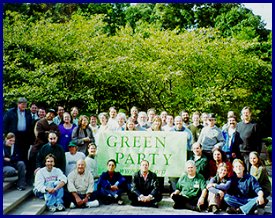Report from the Green Party:
A Democratic Response to the Crisis – Sept 29th, 2001.
CONTENTS
A) Conference Stats
B) Speakers
C) Workgroup Breakout Reports
D) Text of Sam Smith’s Speech
E) Photo
* * * * * * * * * * * * *
B) Speakers
Keynote Panel – “A Democratic Response to the Crisis”
* Chris Toensing – Middle East Research and Information Project – http://www.merip.org – Understanding the effects of U.S. foreign policy in the Middle East
* Kit Gage – National Coalition to Protect Political Freedom – http://www.secretevidence.com – Status of efforts to defeat so-called “anti-terrorism” legislation in Congress and to protect political freedom in the U.S.
* Sam Smith – The Progressive Review – http://www.prorev.com/ – See text (Section D)
* Anita Rios – Green Party of the United States – http://www.gp-us.org/ – Green Party’s roll in responding to the current crisis
Second Panel – “Electoral Politics in the These Times”
* David Cobb – Texas Green Party
* Gail Dixon – D.C. Statehood Green Party
* Julia Willebrand – Green Party Nominee for Mayor of New York
* * * * * * * * * * * * *
C) Workgroup Breakout Reports – Conference participants broke into four workgroups to discuss future organizing in the context of the current political crisis. Thanks to Susan Metz for taking notes.
* Media & Message – The Media & Message group is establishing a listserve for media work and communication. Additionally, thoughts that were shared included: Sound bite reality means that complicated messages get shortchanged in most media; need to talk folks “where they are at”, and be based in emotional and values-based appeals; “Americans need to insure no innocent people pay for “this crime”; sense that “Holy War” is an oxymoron; “Rambo is fantasy, graves are reality”; need to emphasize public need for “transparency in government policy”; focus on positive vision of Green politics for non-violent society; see following website for advice on good media work: http://www.fenton.com
* Non-Violence – Notes available from: hrezz@earthling.net
* Coalition Building – General discussion: Need to look for unlikely allies (e.g., Cato Institute); do your homework to find out what messages your potential partners are likely to spread; be sure that you are “seen being Green” and are identified as a Green whenever appropriate; assert your “Green” message outside of the coalition as well as within it; ensure that Greens are represented on any public platforms; make use of Green perspectives to dig into deeper and broader issues; be sensitive to support and participate in leadership, and not to exploit.
* Direct Action – Can enhance or complicate electoral politics; need to continue use of direct action especially now, to remain visible and expand democracy; possibility of shutting down shareholder meetings to protest crisis profiteering; protest exclusion from debates, establish our own debates, in coming elections; use of theater and ability to act spontaneously and/or quickly both still valuable; develop programs for community self-protection in place of police; consider bringing “witness” idea to new level – attempt direct engagement with other people to focus on emotional and compassionate response to crisis (i.e. – going into cafe’s, bars, libraries, other public spaces with purpose of engaging public in a compassionate way).
* * * * * * * * * * * * *
D) Text of Sam Smith’s Speech to the conference:
I want to talk about the problem of talking about the problem.
These aren’t the only alternatives.
There is the probing and the prodding of the teacher, raising a question here, a doubt there, and skepticism along the way.
There is the quiet witness which when pressed says something like: my faith teaches me that we must find answers outside of anger and violence.
There are the examples from history – best of all American or military history. I sometimes remind people that we haven’t won a war since World War II, unless you count Granada. A simple fact like this can alter the tone of the conversation.
We have lost much of what was gained in the 1960s and 1970s because we traded in our passion, our energy, our magic and our music for the rational, technocratic and media ways of our leaders. We will not overcome the current crisis solely with political logic. We need living rooms like those in which women once discovered they were not alone. The freedom schools of SNCC. The politics of the folk guitar. The plays of Vaclav Havel. The pain of James Baldwin. The laughter of Abbie Hoffman. The strategy of Gandhi and King. Unexpected gatherings and unpredicted coalitions. People coming together because they disagree on every subject save one: the need to preserve the human. Savage satire and gentle poetry. Boisterous revival and silent meditation. Grand assemblies and simple suppers.
Here are some pocket paradigms to carry around:
We pledge allegiance to the republic for which America stands and not to its empire for which it is now suffering.
Why does the media always refer to people defending our civil liberties and the Constitution as “activists” or “advocates?” Wouldn’t “citizens” do just as well?
The World Trade Center disaster is a globalized version of the Columbine High School disaster. When you bully people long enough they are going to strike back.
Some day our leaders may again be as good as our firefighters.
* * * * * * * * * * * * *
E) Photo – by Elizabeth Shanklin
Greens remaining after the D.C. organizing conference gathered for a group photo:
Ben Manski Green Party of the United States
Steering Committee
manski@greens.org
http://www.gp-us.org/
